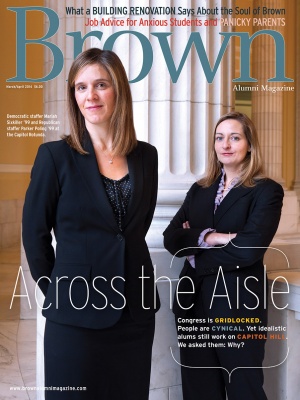As spring arrives and the University prepares to send a new batch of graduates into the world, the job search becomes more intense than ever. Facing what some economists have labeled a jobless recovery doesn’t help. Andrew Simmons, who directs the campus office called CareerLAB, spends his working days helping students successfully navigate that transition. The BAM recently asked him for advice aimed at parents as well as their kids.

SIMMONS The world looks like a scary place. The economy is more stratified than ever. The good news is that people with a college education have much lower rates of unemployment than everybody else. But when you look at the economy in the aggregate, it’s like you’re going to be either very successful or very unsuccessful. There are far fewer middle-skill jobs.
BAM So what do you advise all the panicky parents?
SIMMONS Don’t panic! It’s
important to take a step back and act as a sounding board. Don’t be
prescriptive. Don’t say, “We’ve spent all this money and you should do
A, B, or C.” The reality is that we all have different skills, we have
different interests, and we’re better at different things. So part of
what you’re paying for at Brown is for your student to figure that out.
BAM What’s the hardest part for anxious students?
SIMMONS Most students have
trouble narrowing down their choices, rather than figuring out what the
choices are. For some students, that may manifest itself as feeling “I
don’t fit anywhere.” They see their premed friends or their friends who
interviewed with investment banks or consulting companies, and say,
“Oh, that must be all there is, and because I can’t picture myself
doing that, therefore there is no place for me.” Nothing could be
further from the truth.
BAM What’s the most important lesson a parent can teach?
SIMMONS How to be
proactive. At the end of the day we all have to be able to do these
things ourselves, and the career development process is a very
different animal from the college application or anything else your son
or daughter has done before.
BAM A lot of students start companies of their own. What motivates them?
SIMMONS I think there’s a
certain idealism around the idea of entrepreneurship. Not just
for-profit, but even in nonprofits, there’s the idea that, if you want
to make something happen, you’re going to make it happen yourself.
There’s a very active student entrepreneurship group, and there are a
lot of alumni in this space.
BAM There’s a big emphasis
these days on STEM degrees—science, technology, engineering, and math.
Are there still jobs for history concentrators?
SIMMONS Not every job out
there requires a STEM degree, but students do need analytical
proficiency—the ability to take information, to process information,
and to make conclusions about that information in the name of solving
problems. If you’re a humanities concentrator, take a statistics class.
Take it pass/fail. If you’re a biochemistry concentrator, even if
you’re thinking about medical school, take a writing class. Those
classes are always offered pass/fail.
BAM What should students be doing outside the classroom?
SIMMONS Get an internship
in a field that looks like it could be interesting to you. And the most
important part is to work with somebody at Brown, ideally in CareerLAB,
who will help you to translate your experience for the audience out
there. It’s not good enough to have it splattered on a résumé. You have
to be able to look at a particular company or organization or medical
school and not say, “I’m great—take me.” Instead you have to say, “I
read your job description and understand your needs. Here’s where I
think I fit and can make a great contribution to your organization.”
That’s a very different narrative than these students are used to
spinning.
BAM These days a lot of internships are unpaid. What’s your advice for students who need to make money during the summer?
SIMMONS There are a number
of very good paid opportunities in the summer, depending upon what the
student is interested in. We also have a growing pool of money to
support high-quality internship experiences that either don’t pay much
or pay nothing at all. In fact, President Paxson has set Brown on a
course toward funding more students on financial aid for research and
internship experiences.
BAM How about students for whom even that feels like a luxury?
SIMMONS Of course, many
students need to work jobs that don’t seem relevant to their
educational or professional goals, and that’s very much the norm for
college students—and who knows what you’ll learn from a job like this?
It’s also possible for students to work at a paid job and do
informational interviewing with alumni, volunteer work, and even some
job shadowing on the side. I would advise those students to develop a
relationship with someone in the CareerLAB. We can help.




